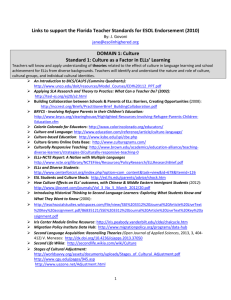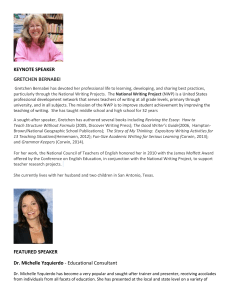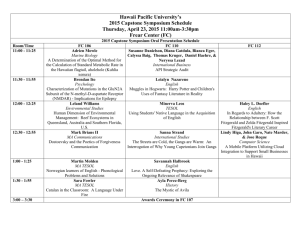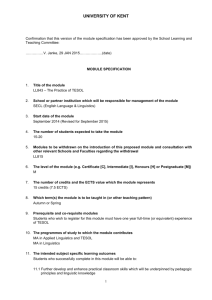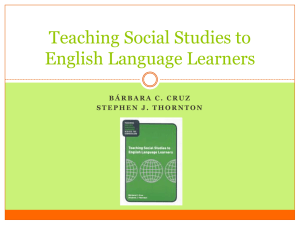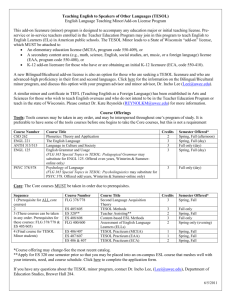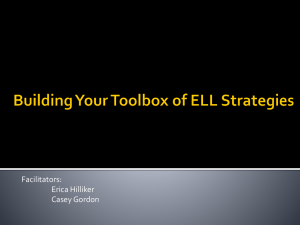Strategies for encouraging adult ELLs to speak English
advertisement
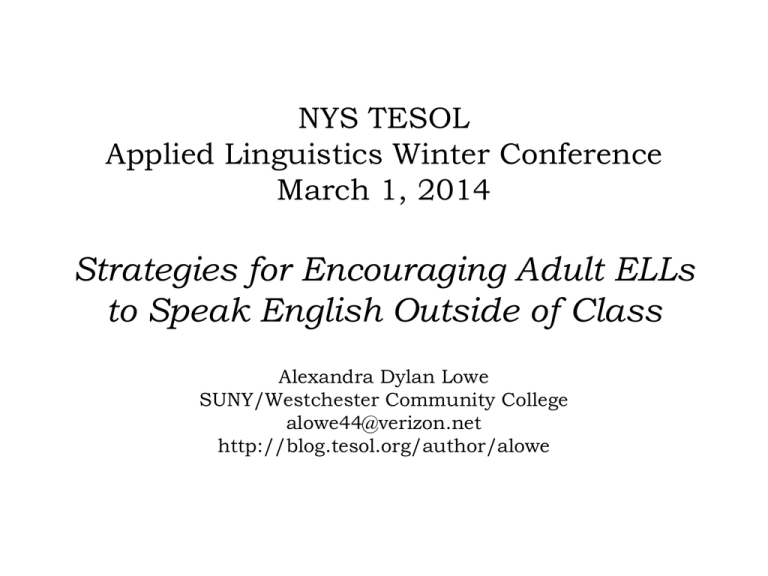
NYS TESOL Applied Linguistics Winter Conference March 1, 2014 Strategies for Encouraging Adult ELLs to Speak English Outside of Class Alexandra Dylan Lowe SUNY/Westchester Community College alowe44@verizon.net http://blog.tesol.org/author/alowe Why are we here? Do you recognize any of these students? • A student who doesn’t answer the telephone when it rings at home. • Or who asks for Con Ed’s Spanish-speaking customer service representative • Or who shops only in Brazilian stores where they can speak Portuguese. Recognize any of these? • Or who only goes to doctors who speak Japanese. • Who wouldn’t let their children have play dates with American children because they are afraid to speak to the playmates’ mothers. • Or who uses an online book reading service to read a bedtime story to their children rather than read in English to them. Rome wasn’t built in a day . . . . and neither is self-directed learning Self-directed learning: 5-step process Step 1: Consciousness-raising on Day 1 Step 2: Advice from fluent ELL’s Step 3: Discovering the secrets of successful ELLs Step 4: Making a Personal English Plan Step 5: Success Books Logs - Tracking implementation of the plan Step 1: Consciousness Raising from Day 1 The Mixer: “How do you practice English outside of class?” Debriefing . . . . What did you learn from your classmates? Favorite TV shows in English? Movies? What books have you read in English? Websites? Who do you speak English with? The English hours add up . . . . Our Students Their Children 6 hours/week of ESL 30 hours/week of school class 2 hours/day of cartoons on TV = 14 hours/week 2 hours/day of video games = 14 hours/week Play dates = 2 hours/week Total: 6 hrs/week Total: 60 hours/week The Pemex Parable Step 2: Advice from Fluent Non-native Speakers of English Liliana: No more TV in Spanish. Keep the TV on in English when you are home. You have to make a plan for yourself. Find someone you work with and ask them to how say this or that. – Read in English. – Talk to old people. https://www.youtube.com/watch?v=LPRK3P3C6A – – – – Step 2: Advice from Fluent Non-Native Speakers of English Eugene: – Seek out English speakers and imitate them. – Talk to yourself in English. Try to think in English. – Play your favorite DVDs over and over again, picking up new words each time. – Jot down new vocabulary words and idioms. Use them right away. Step 3: Discover the secrets of successful adult ELLs Step 3: Discover the secrets of successful adult ELLs Step 3: Discover the secrets of successful adult ELLs • Run away from people who speak your language. Be in contact with as many English speakers as possible. Ask them to correct you. • Expose yourself to America and to American culture. Avoid stores and other locations in the U.S. where they speak your language. • Watch movies and TV without Spanish subtitles. Use English closed captions. • Just try to speak – if necessary, use gestures. • Try to think in English. • Keep a pencil and a notebook with you to write down new words and expressions. And still more “secrets” • Talk to somebody with modern tools, such as Skype, Facebook, YouTube, QQ. • Watch TV. • Don’t hang out with Arabians. • Carry a notebook around and write down new vocabulary words • Don’t to [sic] make Japanese friends • Read newspapers • Listen to music and try to find out the lyrics. • Don’t be affraid [sic] of asking when you don’t know the meaning. Step 4: Make a Personal English Plan MY PERSONAL ENGLISH PLAN March 2014 Here are 3 ways I plan to spend more time speaking English this month: 1. 2. 3. I plan to spend _______ minutes/hours speaking English every day. Here are 3 ways I plan to spend more time listening to English this month: 1. 2. 3. I plan to spend _______ minutes/hours listening to English every day. Edgar’s Plan “In my job, at least one small word or a short phrase I’ll add to every people I receive, not only with the “Hello, how are you?” This method will be the beginning to a possible conversation. 20 people a day I say hello, 3 of them answer me back, I’ll have talked at least 3 persons every day. And it’s only the beginning.” Step 5: Tracking Success Getting Ahead in English Outside of Class Success Book Log for the week of ____________________, 2014 Log for theWHAT weekI of __________________ , 2014 DATE DID TIME SPENT March 1, 2014 Asked the librarian to demonstrate how I can download free audiobooks (“talking books”) to my smartphone March 2, 2014 Watched a movie in English on TV March 3, 2014 Used my computer to practice grammar online. March 4, 2014 Had lunch with a classmate to practice speaking English March 5, 2014 Listened to the news in English on the radio in the car going to and from work March 6, 2014 Watched “Criminal Mind” on TV. Met with my conversation partner. March 7, 2014 Listened to a “talking book” on my smartphone. Weekly Total 30 minutes 1 hour 30 minutes 1 hour 30 minutes 1 hour 1 hour 30 minutes 6 hours Success Book World Record 45 hours in one week !! Some of the changes students start to make: • They start answering the phone at home. • One student started scheduling weekly play dates for her son with an American boy his age, and then would spend 2 hours talking with the boys’ mother. • A Mexican waiter started sitting with the American waiters at the communal meal after work, rather than sitting with the Mexican busboys. And still more changes . . . . • Seeking out English-speaking co-workers • Talking to their cable company’s customer service rep in English • Talking to strangers in public settings • Helping their children with their homework and reading to their children in English • Ramping up their own reading – downloading audiobooks from the library (Dreams of My Father, Fifty Shades of Gray, Harry Potter) And even more changes . . . • Talking to the customers at their husbands’ small business (garage, upholstery business) • Going out for a beer with teammates after a soccer game instead of heading home. • Joining “Meet Ups” • Joining a student club on campus. • Volunteering Success builds success! Resources Getting Ahead in English Outside of Class: Next Steps, http://blog.tesol.org/getting-ahead-in-english-outside-of-class-nextsteps/ Getting Ahead in English Outside of Class, Day 1, http://blog.tesol.org/getting-ahead-in-english-outside-of-class-day-1/ Lowe, Alexandra Dylan, “Self-Directed Learning: Personal Speaking Plans for Adult ELLs”(TESOL Connections, December 2012), http://newsmanager.commpartners.com/tesolc/issues/2012-1201/3.html Lowe, Alexandra Dylan, “Self-Directed Learning Strategies for Adult ELLs” (TESOL Connections, March 2012), http://newsmanager.commpartners.com/tesolc/issues/2012-0301/2.html Thank you for joining me today! Alexandra Lowe (914) 329-0166 alowe44@verizon.net http://blog.tesol.org/author/alowe
